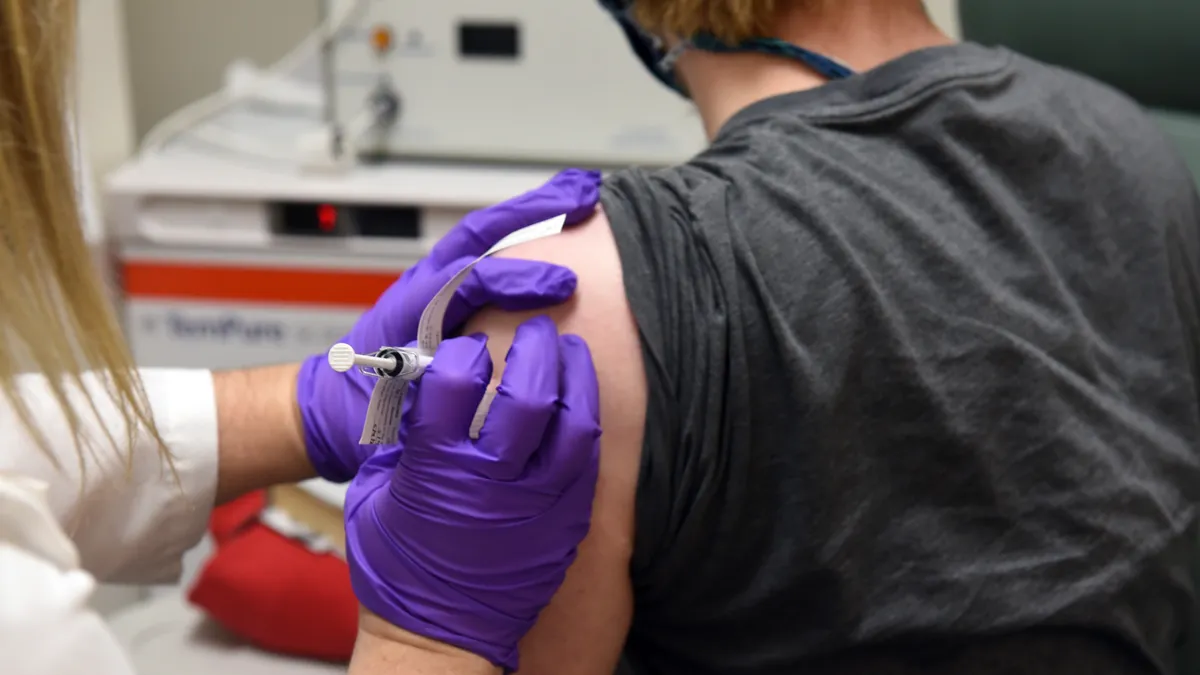Dive Brief:
-
Many states have lifted eligibility restrictions for the coronavirus vaccine, but some unauthorized immigrants are encountering barriers to getting their shots, according to several media reports.
-
Colleges should take steps to ensure these hurdles don't prevent unauthorized students from getting vaccinated, such as sharing information with students about policies at nearby pharmacies and mass vaccination sites.
-
Colleges are gearing up to hold more face-to-face classes in the fall, but those plans rely on most students getting vaccinated.
Dive Insight:
President Joe Biden said during an interview with Univision in February that unauthorized immigrants should be able to get vaccinated against the coronavirus without fearing deportation. Earlier that month, the U.S. Department of Homeland Security also said that it would not conduct enforcement operations at or near vaccine distribution sites.
The Biden administration's vaccination plan, released in January, included a commitment to providing all people in America the vaccine free of charge and regardless of their immigration status. Still, media reports indicate unauthorized immigrants are having trouble accessing the shots.
Some pharmacies distributing the shots have been asking for social security numbers and insurance information — neither of which are required to receive a vaccine. And Florida has been requiring people to show their state IDs at vaccination clinics, though "seasonal residents" can instead bring two other types of documents, such as a rental lease agreement or utility bill, according to a state website.
Unauthorized immigrants, including college students, could have trouble clearing these obstacles. While students participating in the Deferred Action for Childhood Arrivals program, which shields them from deportation, may be eligible to receive Social Security numbers and state IDs, other unauthorized immigrants may not be.
Unauthorized students make up around 2% of college enrollment, and about half that share participate in or are eligible for DACA, according to a report last year from New American Economy and the Presidents' Alliance on Higher Education and Immigration.
At a vaccination site at Miami Dade College, in Florida, students can show a state driver's license or another form of identification plus a utility bill, a spokesperson said.
The University of Central Florida, which has an on-campus vaccination clinic, accepts student IDs as proof of residency, a spokesperson said in an email, noting that the school isn't aware of any DACA students having trouble accessing the vaccine.
"We have no control over state or federal vaccination sites; however, we are aware that local vaccination clinics are accepting forms other than a driver's license as proof of residency, and we've shared that information with our community," the spokesperson wrote.
Students also may be hesitant to join waitlists for government-run vaccination sites, especially after the Trump administration took a hardline stance on immigration and reportedly sought out private data to track locations of unauthorized immigrants.
"The fear is real," said Gabriel Serna, an education professor at Michigan State University. "The question is, how do we make sure that these students are able to access these vaccines without being fearful of being put into some kind of process where their documentation status is going to harm them."
One way colleges could help is by circulating a list of pharmacies and vaccination sites among campus community members that don't ask for this type of information or that promise students anonymity, according to Serna and Daniel Morales, a professor at the University of Houston Law Center, in Texas.
Colleges can also wield their influence with state lawmakers, Morales said. "Universities are powerhouses within their state and have lots of connections with legislators," Morales said. "A lot of it is about pushing university leadership on your campus to use their connections and raise awareness of the issue."














